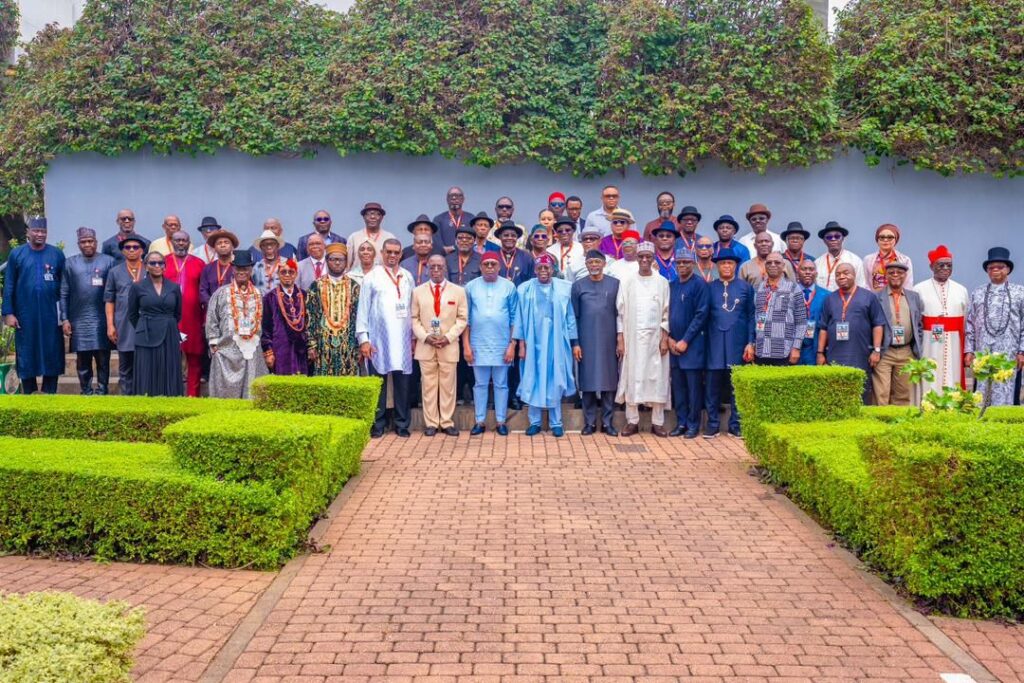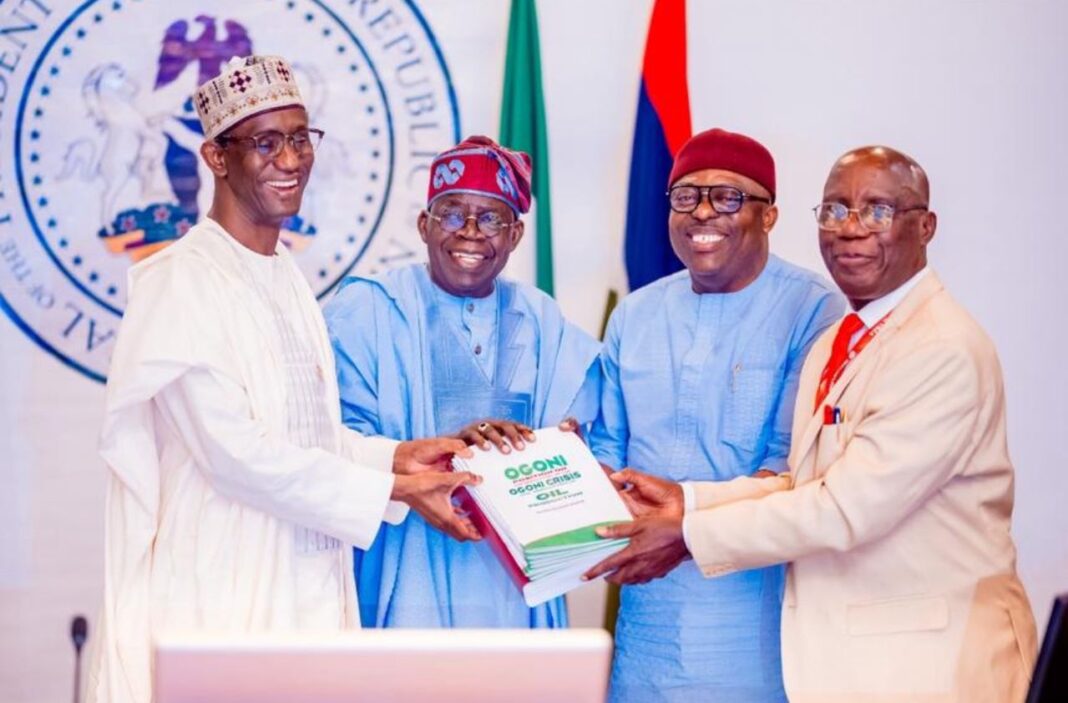President Bola Ahmed Tinubu on Wednesday conferred posthumous national honours of Commander of the Order of the Niger on four Ogoni leaders whose deaths in May 1994 helped set in motion one of Nigeria’s most painful chapters. The move came as the president received the report of the Presidential Committee on the Ogoni Consultations, chaired by Professor Don Baridam, at the State House in Abuja. Tinubu framed the recognition as part of broader efforts to pursue reconciliation in Ogoniland and to advance talks on restarting oil production in the region.
The four men honoured are Edward Kobani, Albert Badey, Theophilus Orage and Samuel Orage. Their killings in 1994 were a flashpoint in the sequence of events that led to the arrest, trial and 1995 execution of nine Ogoni activists including Ken Saro-Wiwa. Those events drew international condemnation at the time and have continued to shape debates about justice, accountability and environmental redress in the Niger Delta for three decades. The decision to recognise the Ogoni Four follows Mr Tinubu’s earlier action in June to confer honours on members of the Ogoni Nine, a move that generated both praise and criticism across civic groups and rights organisations.
The presidential presentation of the Ogoni Consultations Committee report and the honours ceremony were accompanied by a clear signal from the presidency that the administration sees political reconciliation as a necessary prelude to reopening commercial activity in Ogoniland. Officials say the report contains recommendations on community engagement, environmental remediation, security arrangements and benefit sharing. The presidency has urged stakeholders to embrace dialogue, while also instructing ministries and regulators to begin preparatory talks on how oil production might resume in a manner acceptable to local communities. These are sensitive matters and the administration says it will proceed with consultations to avoid reigniting old wounds.
Reactions have been mixed and immediate. Some Ogoni families and local leaders welcomed the honours as overdue official recognition of lives lost during a period of extreme violence and repression. For these voices, the honours are a symbolic correction and an important step toward collective healing. Other activists and rights groups warned that awarding honours without full exoneration or without binding commitments on environmental clean up could feel hollow. Amnesty International and several local civil society organisations have previously argued that pardons and honours are not substitutes for transparent investigations, reparations and concrete steps to hold those responsible to account. Those concerns resurfaced when the president pardoned the Ogoni Nine earlier in the year, prompting calls from some quarters for full exoneration rather than a pardon that implies past guilt.
The historical context matters. In May 1994 four Ogoni chiefs were murdered, an incident that the military government used as the basis for sweeping arrests of MOSOP leaders. In 1995 a special tribunal convicted and executed nine Ogoni activists, igniting international outrage and contributing to Nigeria’s diplomatic isolation at the time. Over the intervening decades the Ogoni struggle became emblematic of wider Niger Delta grievances about environmental damage, weak regulation of oil operations, and the socioeconomic marginalisation of host communities. Any present day policy aimed at reopening oil activity therefore must grapple with that legacy and the deep distrust it has produced.
Policy experts and analysts say the honours and the consultations report are only the opening moves in a complex process. Environmental remediation of Ogoni land and water will require sustained funding, independent technical assessments and long term commitments from both government and industry. Community trust will depend on accountability measures, legally enforceable benefit sharing mechanisms and transparent monitoring. Economists caution that restarting production is not simply a matter of turning valves but of rebuilding social licence to operate. Without clear guarantees on remediation and community welfare, any attempt to resume extraction risks renewed opposition and instability.
The presidency has pledged a coordinated approach. Ministries involved in petroleum, environment and Niger Delta affairs have been asked to study the committee’s recommendations and lay out a roadmap for implementation. The government also says it will engage with multinational oil companies and with state authorities in Rivers and neighbouring states to ensure that any restart of activity aligns with national regulations and with the wishes of Ogoni people as expressed through consultations. Observers will watch whether these pledges translate quickly into independent environmental audits, legally binding clean up plans and an inclusive process for revenue sharing.

For now the honours are a formal recognition meant to acknowledge a painful past. They have reopened conversations about justice for the Ogoni and about the wider challenge of how Nigeria addresses environmental harm linked to decades of oil production. Whether the awards become a stepping stone to concrete remediation, durable reconciliation and responsible development will depend on follow through, credible oversight and the willingness of all actors to accept robust, independently verifiable terms. In the absence of those elements the honours risk being remembered as a symbolic gesture alone rather than a turning point.
The administration says it will publish the committee report and its planned next steps in due course. That transparency will be essential if the process is to win wider confidence at home and abroad. For residents of Ogoniland and for Nigerians watching a sensitive national reckoning unfold, the coming weeks will be telling. The honours recognise loss and memory. What remains is the harder work of translating recognition into justice and tangible change on the ground.
Samuel Aina

